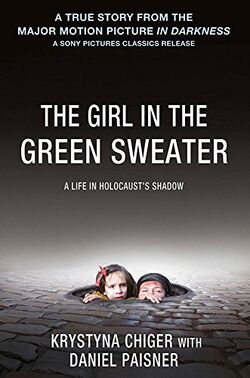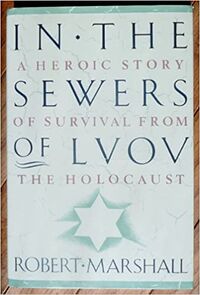Krystyna Chiger / Kristine Keren (F / Poland, 1935), Holocaust survivor
Krystyna Chiger / Kristine Keren (F / Poland, 1935), Holocaust survivor
Pawel Chiger (M / Poland, 1939), Holocaust survivor
- KEYWORDS : <Lwow Ghetto> <Hidden Children>
- MEMOIRS : The Children Accuse (1947), 191-194 -- The Girl in the Green Sweater (2008) -- See also In the Sewers of Lvov (1993), by Robert Marshall
Biography
- Holocaust Survivor Testimonies, Poland #2352 (6 Feb 1947)
Kristine Keren (borm Krystyna Chiger) was born in Lvov, Poland (Lviv, Ukraine), on October 28, 1935, to Ignacy and Paulina (Pepa) Gold Chiger. Krystyna had one brother, Pawel, born May 18, 1939. They survived hidden in the sewers of Lvov.
"The author lived in Lviv. After the liquidation of the ghetto, she hid with her parents and brother in the sewers for 14 months. A group of 11 people survived in the sewers until liberation thanks to the help of the canalists."
Yad Vashem
Kristina Keren (Krystyna Chirowski) was seven years old when her family escaped from the massacres in Lwow and went into hiding in the city's sewers. For almost one and a half years they remained in the underground tunnels, never seeing daylight, and completely dependent on the help of Leopold Socha, a sewer worker of the municipality.
Book : The Girl in the Green Sweater (2008)
- The Girl in the Green Sweater: A Life in Holocaust’s Shadow (New York, NY: St. Martin's Griffin, 2008).
"In 1943, with Lvov's 150,000 Jews having been exiled, killed, or forced into ghettos and facing extermination, a group of Polish Jews daringly sought refuge in the city's sewer system. The last surviving member this group, Krystyna Chiger, shares one of the most intimate, harrowing and ultimately triumphant tales of survival to emerge from the Holocaust. Originally published as The Girl in the Green Sweater, In Darkness is Chiger's harrowing first-person account of the fourteen months she spent with her family in the fetid, underground sewers of Lvov ... In Darkness is also the story of Leopold Socha, the group's unlikely savior. A Polish Catholic and former thief, Socha risked his life to help Chiger's underground family survive, bringing them food, medicine, and supplies. A moving memoir of a desperate escape and life under unimaginable circumstances, In Darkness is ultimately a tale of intimate survival, friendship, and redemption ... True story from the major motion picture "In Darkness," official 2012 Academy Award nominee for Best Foreign Language Film."--Publisher description.
Book : In the Sewers of Lvov, by Robert Marshall (1993)
- Robert Marshall, In the Sewers of Lvov: A Heroic Story of Survival from the Holocaust, New York: Macmillan Publishing Company.
"Recounts the survival of a group of Jewish refugees living in the Lvov Ghetto, relating how they escaped the Nazis by hiding in the city's sewer system"-- Publisher description.
USHMM
Kristine Keren (borm Krystyna Chiger) was born in Lvov, Poland (Lviv, Ukraine), on October 28, 1935, to Ignacy and Paulina (Pepa) Gold Chiger. Both were from Lvov: Ignacy was born December 8, 1906, to Jakob Chiger and had a sister and a brother; Paulina was born July 23, 1909, to Samuel and Chana Gold and had one sister and two brothers. Krystyna had one brother, Pawel, born May 18, 1939. They owned a textile business and were a wealthy, assimilated Jewish family.
A few weeks after the invasion of Poland by Germany on September 1, 1939, the Soviets occupied eastern Poland. Ignacy was forced to sell the business and the family moved into one bedroom and rented the other rooms. Krystyna attended a Russian kindergarten. In June 1941, Germany invaded the Soviet Union and a week later occupied Lvov. German mobile killing units incited the local Ukrainians to attack Jews and there were a series of vicious pogroms with thousands of Jewish casualties. The Chiger’s were forced into a ghetto and their belongings were confiscated. Paulina was made to work in Janowska labor camp sewing German Arrmy uniforms. Ignacy worked as carpenter for a German SS captain, Josef Grzimek. There were frequent Aktions, when the Germans would round up Jews for deportation to concentration camps. Krystyna saw Jews beaten and killed through the window. During one Aktion, Krystyna and her cousin, Inga, ran away; Krystyna found a place to hide, but Inga and their grandmother were caught. Krystyna saw them put on a truck and when her paternal grandmother waved, she was hit in the head with a rifle butt. Her maternal grandmother was killed during another Aktion. In 1942/43, Ignacy watched from behind a tree as his father and his stepmother were shot on the street. There was a roundup of children in their building, and Krystyna saw several of the mothers commit suicide by jumping off the second floor. Krystyna learned to differentiate between German and non-German footsteps and would hide Pawel in a suitcase under the bed; she then hid behind Paulina’s robe. Ignacy built them a hiding space under a window ledge and he also built a false wall in the basement where the family could hide. They once were discovered by some Germans who beat Ignacy, but finally accepted his watch and some food as a bribe and did not arrest them.
In May 1943, Ignacy heard that the ghetto was going to be destroyed. For several weeks, they hid behind the false basement wall. Ignacy worked digging a hole through to the sewers. One night, a man came into the room through the hole. This was Leopold Socha, a Catholic Polish sewer worker whom Ignacy had agreed to pay to hide the family and deliver food and supplies in the sewers. He recruited two other workers, Stefan Wroblewski and Jerzy Kowalow. In June, as the ghetto was liquidated, the family fled to the sewer pipes with 17 others. They were later joined by an uncle, Kuba Leiw, and her maternal grandfather, Samuel. Water seeped from the walls, the smell was awful, and there were large red rats and yellow worms crawling over the stones. They put their belongings on the stones to sit on and Krystyna sat on Paulina’s knees, and Pawel on Ignacy’s. They rarely moved or got up. They had a carbide lamp, bowls, and an oil stove. These were sewer pipes, not tunnels, so only children could stand upright. Ignacy had to crawl for several miles for water and carry the teakettle in his teeth. Kowalow would watch on the street as Socha and Wroblewski brought black bread and margarine daily, using different manholes to avoid detection. Socha took clothes out for washing weekly. They had to whisper so people on the street would not hear. Pawel, age three, cried often and once, one of the men hiding with them got so angry he pointed a gun at him. When the sewer rushed with water, they had to lean on the stones by the wall so they would not drown. Ten people left because of the harsh conditions, and they were shot after they emerged.
After five weeks, they were discovered by other sewer workers and fled from the main pipe. They found a very surprised Socha who hid them in a side pipe. A couple days later, he led them on two half day marches to a new and larger area further within. Ignacy made small platforms from wooden slats that slept three people. Krystyna, and then Pawel, contracted measles and other illnesses and everyone had lice. At one point, the hiding place caught fire and during storms, it would flood. After a year, Ignacy ran out of money to pay the sewer workers, but they continued to help. Socha paid for the supplies and brought Krystyna school books and Paulina and Ignacy taught her to read and write. One woman had a baby, who was suffocated. Kuba drowned while gathering water and Samuel was lost and presumably shot. Socha brought a Russian prisoner of war, Tola, to hide there and gave Ignacy a gun to shoot him if he tried to escape.
By summer 1944, they knew that the Soviet Army was advancing towards Lvov. In July, they heard the Germans digging above them, but Socha told them to stop because there was a gas pipe. On July 23, the city was liberated. Socha had heard of attacks on Jews who had survived, and waited a few days. On July 27, Krystyna and the others heard knocking on the grates and Socha and the other workers told them they were free. After they crawled out of the tunnels, Pawel cried and wanted to go back to the sewers because he was afraid of the light and people. In March 1945, the family moved to Krakow. Antisemitism was very strong in the city. They changed their name to Chyrowski which sounded more Polish. The principal of Krystyna’s school told her to pretend to be Catholic, so Krystyna learned prayers and had a first communion. After the war ended in May, Paulina learned that she and her sister were the only survivors of her family. Ignacy’s sister was killed; his brother presumably died while serving in the Soviet Army, and his mother was murdered in Belzec. That same month, they received a telegram that Socha had been hit and killed by a car.
In 1957, the family immigrated to Israel. Krystyna graduated from Hadasa University dental school and had a private practice. In 1960, she married Marion Kwasniewski. Marion and his mother, Helena, had been rescued from Plaszow concentration camp by Oskar Schindler. Ignacy, 68, passed away in 1975. Pawel, 39, died in 1978, while in the Israeli Army. Paulina, 90, passed away on January 10, 2000. In 1968, Krystyna and Marian immigrated to the United States. She Americanized her name to Kristine Keren. The couple has two sons. Leopold Socha and Stefan Wroblewski were recognized by Yad Vashem as Righteous among the Nations.

